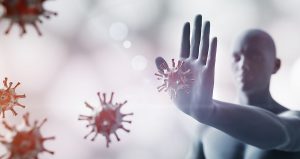With many people dying from coronavirus infections, the question is, will herd immunity eventually slow the spread of Covid-19 coronavirus? A large study from Spain is giving us a cautious answer. Spain was one of the European countries most affected by the pandemic.
Researchers were able to select 35,883 households through municipal records. All family members were invited to be part of the study. This resulted in 61,075 participants who were part of the study, which was 71.5% of all contacted persons. Participants received a blood antibody test for the Covid-19 coronavirus. If agreed, they also donated a blood sample for a second test, a chemiluminescence immunoassay.
The antibody test had a prevalence of 5.0% while the immunoassay was 4.6% positive. In Madrid where there were the most Covid-19 cases, the antibody prevalence was 10%. In coastal areas where there were fewer cases, the prevalence was less than 3%.
Some findings of the study regarding symptoms and Covid-19 tests
- 195 patients were identified who had positive PCR tests (polymerized chain reaction test for Covid-19 coronavirus) two weeks before the study. They tested 87.6% positive with both the antibody test and the immunoassay. With either one of these two tests they tested 91.8% positive.
- In 7273 patients who lost their sense of smell (anosmia) or others who had at least three Covid-19 symptoms antibody titers were positive in 15.3% to 19.3% of the cases.
- 9% to 35.8% of the seropositive patients (patients with positive antibody tests) were completely asymptomatic.
Interpretation
The authors of the study noted that in the vast majority the Spanish population tested seronegative, even in hotspots, like Madrid. They concluded that it is very unlikely that there will ever be a herd immunity regarding the Covid-19 coronavirus. The Mayo Clinic write-up about herd immunity is interesting.
It explains that herd immunity can develop when a large proportion of people become immune to a disease. This means that the spread of an infective agent becomes less likely. But in a disease like the measles, which is highly contagious, about 94% of the population must be immune before herd immunity sets in. According to the Mayo Clinic report about 70% or more of the US community would have to recover from Covid-19 before herd immunity became significant. It is impossible to achieve herd immunity with values of 5% of antibodies in a country like Spain and 10% in hotspots. it is simply unrealistic to think that there would be enough immune people to protect those who never were infected with the virus. The only alternative are restrictive measures, distancing, staying home, wearing masks in public etc.
Conclusion
It is unlikely that herd immunity will play a significant role with regard to the spread of the Covid-19 coronavirus. In a study from Spain the antibody responses were only 5% in the population at large and 10% in hotspots where there was more infection present. About 1/3 of seropositive patients were completely asymptomatic. This allows for transmission of the virus again. We do not know at the present time how long protective antibodies stay around after a person has had the Covid-19 coronavirus, which complicates the concept of herd immunology in the case of Covid-19 coronavirus.
Recurrent infection possible, herd immunity unlikely
Some physicians reported that people who suffered from the virus came down with it again some weeks and months later. This indicates that the immunity to the virus does not last that long. In the population at large this can mean that a second wave of infection is possible. We also do not know at this time what a vaccine against the coronavirus will do. Will it provide long lasting immunity or not? Whatever, the answers to these questions may be, it is clear that herd immunity is not something that seems possible with the Covid-19 coronavirus.







